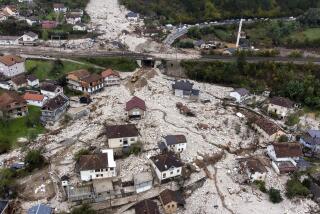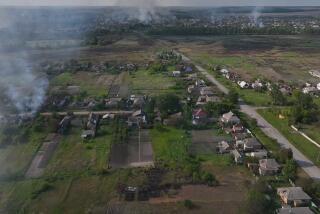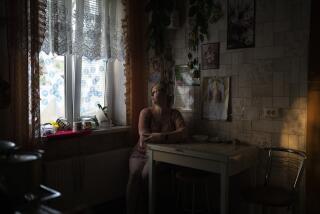Bosnian Town Asks if World Has Forgotten It
BIHAC, Bosnia-Herzegovina — The Serb militiamen moved their guns into position on the surrounding hills in early June, delivered an ultimatum to the mayor, and on June 12 opened up on the town with a heavy, daylong bombardment, the opening blast in the siege of Bihac.
The intensity of the shelling rises and falls, but the 70,000 people who live here, most of them Muslim, are used to waking around dawn with the crash of artillery and mortar shells falling every few minutes for about two hours. The same pattern is repeated just after dark.
In the meantime, people do what they can to make life seem normal. This is not easy. There is no electricity in Bihac, except that provided by a few gasoline-powered generators. Telephone communications have been cut since April, when the war in Bosnia-Herzegovina began. The local supermarket, its stocks sold out, has been closed for weeks. Virtually no one works. Virtually no one has been paid. The big regional hospital, where 60 physicians are still on duty, has treated 619 wounded and received the bodies of 108 killed.
Through the calmer hours of the day, the people scrounge for food, fill sandbags or stack firewood in front of their doors, wish they had money to buy cigarettes and dream about leaving, but realize they can’t. Most of all, they wonder whether the rest of the world has forgotten they exist, or whether it would do anything to ease their plight if it was reminded.
Bihac seems next in line for the Serbian program of “ethnic cleansing,” a process that has swept across a score of northern Bosnian cities and towns as the Serbs seek to link their territorial gains in a solid-Serb corridor across this former Yugoslav republic.
According to local officials and U.N. observers, the Serbs have made their aim clear: They want to relocate 300,000 Muslim Bosnians who make up more than 80% of the population of northwestern Bosnia--an area known as the Bosanska Krajina--and replace them with Serbs.
“They are very straightforward about it,” said Maj. Helge Ringdal, the Norwegian head of the area’s U.N. observer force. “They simply introduced us to it as their goal. They said they want to clear the Muslims out of the Bosanska Krajina, move them to an area around Sarajevo, and move 150,000 Serbs from that area up here.”
Ringdal said he listened to the Serbian plan with a straight face and offered no comment in rebuttal. But he found their gall amazing. The land in the Bosanska Krajina is both beautiful and bountiful, with green hills and lush, fertile valleys. The land to which the Serbs would like to move the Muslims is rocky and hard to farm. But the brass in the Serbian plan is not about the value of real estate, but in the method of the exchange: sheer force applied in the name of ethnic “purity.”
“I call it terrorism,” Ringdal said of the artillery blasts that rain randomly on Bihac every morning and evening. “They want to stress out the people so they will leave.”
Refugees, mostly Muslim and Croatian, have been pouring into the region of Bosanska Krajina from towns already under the hammer of Serbian forces. This week, the town of Bosanska Krupa capitulated, with the mayor requesting the urgent evacuation of 5,000 children and sick and elderly people. Last week, the office of the U.N. High Commissioner for Refugees was coerced, effectively, into removing more than 7,000 Muslims from the city of Bosanski Novi, which sits at the opposite end of the Una River from Bihac and marks the southern boundary of the Bosanska Krajina that the Serbs aim to “purify.”
But there is a growing feeling here that this area, at a minimum, might be saved from the Serbian plan by international intervention, a notion that has so far been treated with extreme caution by the West, which is fearful of getting caught up in a nightmare war of Balkan ethnic extremists.
Along with this, there is also a growing realization that this is not an “ethnic” war in the usual sense--that is, a war of two religions or groups whose enmity for each other is equal and potentially lethal for both sides--but rather a war launched by the Serbs for purely political reasons against the Muslims, among whom they have lived and worked, peacefully, for generations.
“My best friends are Serbs,” said Dragica Karajic, an executive of the huge Agrokomerc food production cooperative (now at a virtual standstill) in the Bosnian border city of Kladusa. “They are people with children, and they are coming to me, crying and apologizing, but saying that they have to leave. We know what this means. Always the pattern is the same. The Serbs are told they have to leave, and then the shelling starts.”
The shelling has not started in Kladusa, as it has in Bihac, but, as she says, the pattern in Bihac was the same. Now there are only about 400 Serbs left in Bihac. Once they were 18% of the population.
Philippe Noel, who heads the International Committee of the Red Cross operation in Bihac, is one who argues that the Bosanska Krajina is one place where the international community could make a stand against “ethnic cleansing.”
“If there is any place that is logical to do it, it is here,” he said Friday, pointing out that the area around it, territory of Croatia now in the hands of Serbian forces, is controlled by U.N. peacekeepers. The Serb militias in the area have surrendered heavy weapons, tanks and artillery, to the U.N. forces, and the roads into the area could be easily controlled.
Ringdal called the area a “good candidate” for receiving supplies of food and other essential material under U.N. or other international protection. He noted that the Agrokomerc food production facilities could get back in gear if there was a lift in the blockade that now prevents even packaging materials from getting though.
“We have to have help,” said Dzanana Zjakic, a Bihac resident who works for the Red Cross. “People are hungry. Right now there is some food because it is summer, and people have gardens. But winter will come soon. The only store that is open in town is the furniture store. The marketplace is nearly empty. One liter of cooking oil (about a quart) costs 17,000 dinars (about $10). The ordinary salary here is about 25,000 dinars, which will buy one liter of cooking oil, a bar of soap and three cigarettes.”
The mayor of Bihac, Nenad Ibrahimpasic, believes that the “only solution is a military intervention” by the West, however unlikely it may be. Failing that, he wants to get the children younger than 15 evacuated. His repeated appeals to allow a convoy, with food and medicine, into the town have gone unanswered by the Serb authorities. So have his requests to have children taken out.
Perhaps the most severe punishment meted out by the Serbs so far has to do with the isolation of the city. The residents have lived for weeks with mortar and artillery shells falling in the streets, blasting holes in downtown businesses and residential apartments and houses, with no sense that the outside world has any knowledge of what is going on.
International reporters and television cameras have focused on Sarajevo, the Bosnian capital, and the U.N. airlift taking supplies to that besieged city, in effect providing a smoke screen for the far more efficient “ethnic cleansing” operations going on in more remote cities and towns of Bosnia, effectively displacing 2.2 million people, most of them Muslim.
For the residents of Bihac, the message is clear: They are next in line for ethnic cleansing.
Indira Kulenovic, 26, was born here and now works as a translator for the U.N. observer team. Her question, asked on behalf of the rest of the population, is equally clear and challenging:
“Is the rest of the world going to stand by and let this happen?”
More to Read
Sign up for Essential California
The most important California stories and recommendations in your inbox every morning.
You may occasionally receive promotional content from the Los Angeles Times.










